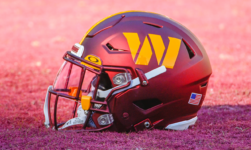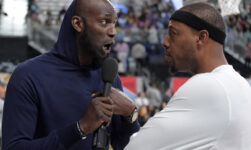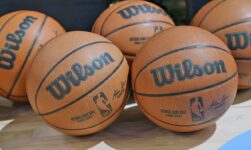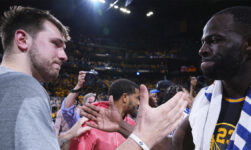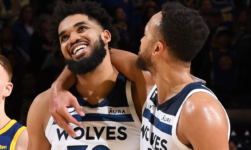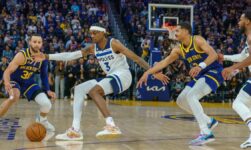Russell Westbrook may want to be traded, but that’s not exactly a request the Houston Rockets are in a position to oblige. Typically, when former MVPs hit the trading block, suitors line up around the block to make offers. That is not going to be the case for Westbrook. In fact, Westbrook might be the single most untradeable player ever to be openly shopped.
Consider the following:
Westbrook is currently owed $132.6 million over the next three seasons. In terms of raw dollars owed, that would make him the second-most expensive player ever traded, narrowly trailing Blake Griffin, who was owed just north of $153 million when he was dealt to the Detroit Pistons in 2018. Griffin had more than four years remaining on his contract, though. Westbrook has three. The $44.2 million average he is owed annually would make him the most expensive per-year contract ever dealt. Since its inception in 1984, the NBA salary cap has increased in all but four seasons. The 2020-21 season will be the fifth. Westbrook’s contract includes eight percent annual raises. The league’s current cap plan calls for annual cap increases between 3-10 percent. There is a chance that Westbrook’s contract represents an even higher percentage of the cap as time passes, and that says nothing of the cash crunch teams are facing during a pandemic. Since the NBA adopted the current three-team format, Westbrook would be the fourth-oldest reigning All-NBA player ever to be traded at 32-years-old. He’d trail Shaquille O’Neal (2009), Dominique Wilkins (1994) and Clyde Drexler (1995), all of whom played in an NBA more forgiving of non-shooters. Westbrook’s shooting deficiencies are so glaring that the Lakers chose not to guard him on the perimeter in the postseason even after Houston abandoned the center position entirely to open space for him. It worked, and as Westbrook’s athleticism continues to decline, it is likely to continue working. Westbrook reportedly wants to return to his role in Oklahoma City as a “floor general,” according to The Athletic’s report. That poses a problem, because the sort of contending teams likelier to be interested in an older All-NBA player are largely contenders in the first place because they already have an elite floor general. The teams that don’t are mostly rebuilding, and therefore don’t have much use for the short-term value Westbrook would theoretically provide. Even if teams are interested in Westbrook, this is a buyer’s market for teams that need ball-handling. Chris Paul, Jrue Holiday and DeMar DeRozan are almost certainly available. Victor Oladipo might be. Kyle Lowry and Mike Conley aren’t exactly available, but their teams would have reason to consider flipping either for the right price. Fred VanVleet is a free agent. Eventually, the music is going to stop and the teams that might have been interested in Westbrook will have filled their point guard seat.
All of this paints a pretty grim picture. Westbrook is still a valuable player under the right circumstances right now. He is getting paid as if he will remain similarly valuable for the remainder of his contract, but his age and playing style suggest that probably won’t be the case. Teams that are willing to bet against common sense will have no shortage of alternatives at his position.
Westbrook might want to be traded. Houston might be willing to trade him. But the two sides have to reckon with the ugly truth of Westbrook’s place in the basketball landscape if they actually plan to find a deal. Right now, Russell Westbrook is a negative value asset. The best-case scenario for Houston probably involves a team willing to take on Westbrook’s contract, either into open cap space or by sending equally toxic contracts back to Houston. More realistically, teams are going to expect Houston to give something up just to take on Westbrook’s deal. The Rockets aren’t exactly in a position to do that. They currently have only one tradeable first-round pick. They’d probably prefer to keep it.
Despite all of this, a superstar is available. Teams are going to sniff around. There aren’t many that make much sense, but these five are the likeliest to look past Westbrook’s defects and roll the dice on his talent and resume.
Most of the contenders can be ruled out quickly. The Celtics (Kemba Walker), Warriors (Stephen Curry), Nets (Kyrie Irving), Nuggets (Jamal Murray) and Jazz (Donovan Mitchell) already have superior long-term lead guards. The Raptors and Heat wouldn’t dare punt away 2021 free agency for Westbrook. The Lakers and 76ers need ball-handling, but they need ball-handling that can shoot. They are looking for supplements to LeBron James and Ben Simmons, respectively, not replacements. The Bucks can’t afford another non-shooter alongside Giannis Antetokounmpo. It is an absolute non-starter.
But the Clippers? They need a point guard. They just finished 28th in total passes per game and 22nd in assists. They’re all-in on the present, and Steve Ballmer can afford the tax payments Westbrook might incur. Kawhi Leonard and Paul George both returned to their southern California roots after starting their careers elsewhere. Another Los Angeles native might appeal to Ballmer’s interest in luring away Laker fans.
The Clippers have plenty of mid-tier salaries they could use to make a deal work. Ironically, there is a version of this trade that can be built entirely around players the Rockets once sent the Clippers in exchange for Chris Paul. Patrick Beverley and Lou Williams combine to make up $21.3 million in salary. We’d need another $11.8 million or so to get up to the legal threshold (80 percent of Westbrook’s salary).
That’s doable through a Montrezl Harrell sign-and-trade. Sign-and-trade deals must last three years, but only the first season needs to be guaranteed. The other CBA quirk that they’d have to contend with would be base-year compensation, which, for trade purposes, allows the Clippers to count only 50 percent of Harrell’s new salary as outgoing money for trade purposes. That’s workable, though. The Rockets would have to pinch pennies elsewhere to avoid the apron hard cap that a sign-and-trade triggers, but if they’re willing to take on Harrell for what would essentially amount to a one-year, $23.6 million deal, this is legal. The Clippers could also close that gap with Ivica Zubac and Rodney McGruder, but that’s nowhere near as funny.
This gives us a deal the Clippers could make, but should they? That’s entirely subjective. It would be the end of their defense-first identity. Westbrook hasn’t been consistently effective on that end of the floor for years. He’d probably hurt their crunch-time offense as well. Who would you rather have taking shots at the end of games: Westbrook or Kawhi Leonard? History suggests that your preference doesn’t matter. Russ is controlling the ball at the end of games. The Lakers would welcome the opportunity to sag off of Westbrook again in order to trap Leonard as they did James Harden.
But the Clippers just had the 21st most-efficient transition offense in basketball. Westbrook helps with that. He takes shot-creation pressure off of Paul George, who could function as one of the most overqualified spot-up shooters in NBA history on this roster. That’s the real appeal here: the pure talent. A team with Kawhi Leonard, Paul George and Russell Westbrook would probably be very, very good. With so many returning role players and the ability to add another through the taxpayer mid-level exception, the Clippers could have that core without sacrificing much in the way of depth.
It’s that loss of identity that makes this such a hard trade to stomach. Remember, the Clippers were championship favorites before the pandemic. They lost in large part because of Harrell’s decline following the death of his grandmother and subsequent absence from the bubble. Is that really a good reason to overhaul an entire roster and bet on a player the Lakers just humiliated on the biggest stage? Honestly, probably not. But if a contender is going to take the plunge, it is going to be the Clippers.
You could argue that the Clippers should trade for Westbrook. You can’t argue that the Knicks should. If the goal is pursuing a championship, Westbrook is the single most harmful player in basketball that the Knicks could add. His gargantuan salary would rob them of cap space for the next three seasons. That is especially important because those years represent New York’s most flexible period. RJ Barrett and Mitchell Robinson are currently on rookie contracts. Three seasons from now, they’ll be making market value and the Knicks will have a much harder time generating space.
There are veteran point guards that might help shepherd Barrett and Robinson into stardom. Chris Paul represents similar cap issues, but at least his track record with Shai Gilgeous-Alexander paints him as an effective mentor. Westbrook monopolizing the offense would do those youngsters no favors, and his lack of shooting would further cramp the court for them. If Westbrook could get them into championship contention, that might make these issues forgivable, but he just lost in the second round alongside Harden. The Knicks have no Harden-caliber running mate for him, and should one become available, they aren’t exactly at the front of the line in terms of tradeable assets. Adding Westbrook makes no sense. It’s a modest short-term gain at an enormous long-term price.
But if any team can be relied upon to act against its own self-interest, it is the Knicks, and sure enough, their interest has already been reported. The fact that they can absorb Westbrook’s deal without sending a cent back to the Rockets makes them Houston’s ideal trading partner. For their own sake, let’s hope the Knicks find a more cost-effective way to fill their point guard hole.
The Magic have been treading water for the better part of a decade. Bad enough to miss the playoffs, good enough never to win the lottery. If nothing else, Westbrook is a change of pace. He’s an elite ball-handler on a team that has started D.J. Augustin at point guard for the past several seasons. He’d sell tickets at one of the few arenas that will probably end up allowing a meaningful amount of fans this season. Is it sound team-building? Probably not. But there’s something to be said for relevance, which the Magic haven’t had since trading Dwight Howard.
The issue they’ll encounter here is that most of their salary is too good to be traded as mere ballast. Yes, the Rockets would probably love Nikola Vucevic, Aaron Gordon or Evan Fournier, but the Magic would presumably want to keep those players alongside Westbrook. A more realistic package would feature the trio of Terrence Ross, Al-Farouq Aminu and Markelle Fultz, which squeaks past the 80 percent threshold at around $35 million combined. The Magic would probably ask Houston to take back Khem Birch as well. At present, they are around $16 million beneath the luxury tax line and would prefer avoiding it. In that vein, they’d probably explore an extension with Fournier, who has a player-option, but could opt out and accept a lower initial salary in exchange for long-term security. This would give Orlando a bit of room to try to use some of the mid-level exception on its bench.
Would either team be particularly excited about such a deal? Probably not. Adding Westbrook to that Vucevic-Gordon-Fournier trio probably yields only a low seed in a suddenly competitive Eastern Conference, especially with Jonathan Isaac recovering from a torn ACL. Those pieces aren’t helping Houston hold onto the No. 5 seed in the brutal West. But it gets Westbrook’s contract off of their books and allows him to run a team again. If those are the two goals, this deal works.
Behold, the one contract in basketball worse than Westbrook’s! A Westbrook-for-John Wall swap helps Washington’s case in retaining Bradley Beal. That combination, along with a re-signed Davis Bertans and plenty of supplementary shooting, would at least produce one of the NBA’s better offenses. Wall might do the same, but he’s a riskier bet given his health.
He makes absolutely no sense in Houston for the same reasons Westbrook didn’t: he needs the ball and he can’t shoot. But truthfully, this is the sort of trade the Rockets wouldn’t make for Harden’s sake. They’d make it as a step toward their post-Harden future. Wall, at his peak, was among the best playmakers in basketball. He has utility as a grownup for youngsters to develop around.
It’s unlikely. The Rockets would probably like to maintain the illusion of post-Westbrook contention. At least if they deal him for some shooters, they can argue they’re getting back to their pre-Chris Paul roots by entrusting the entire offense to Harden. But the Wizards are one of the few teams likely to have real interest in Westbrook, and Wall’s contract is so toxic that they might actually give the Rockets an asset to make this sort of trade. If the Rockets have a rebuild in mind, the Wizards should be on their radar.
Let’s call this a going away present for Gregg Popovich. The Spurs are up to something. Rumors surrounding LaMarcus Aldridge and DeMar DeRozan have grown louder of late. Westbrook doesn’t necessarily fit the rebuilding bill most expected following an impressive bubble showing from their younger players, but he gives Popovich a chance to make his way back into the playoffs before he calls it quits.
DeRozan’s expiring contract is the matching salary here, along with at least one other role player. On first glance, he doesn’t make much sense in Houston given his 3-point phobia and defensive woes, but having one mid-range shooter in a sea of long-distance marksmen has its benefits. Paul proved that when he played for the Rockets. A Harden-DeRozan pairing probably isn’t competing for a championship, but DeRozan’s contract expires after the season, so there’s no real harm in taking him on as an apparent last gasp at winning with Harden.
This deal wouldn’t necessarily be advisable for the Spurs. Dejounte Murray, Derrick White and Lonnie Walker are ready for more responsibility. Westbrook guarantees them less. But pairing him with Aldridge makes sense on paper. Maybe the Spurs could package some of their young talent for a third major piece. At this point, we’re reaching. There just aren’t that many teams that make much sense for Westbrook. The Spurs do if you squint.

